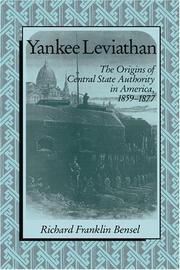| Listing 1 - 2 of 2 |
Sort by
|

ISBN: 9780511527999 9780521391368 9780521398176 9781139939195 113993919X 0511527993 0521391369 0521398177 0511877633 1139930125 0511950713 1139929453 1139933671 1139936875 Year: 1990 Publisher: Cambridge [England] ; New York : Cambridge University Press,
Abstract | Keywords | Export | Availability | Bookmark
 Loading...
Loading...Choose an application
- Reference Manager
- EndNote
- RefWorks (Direct export to RefWorks)
This book describes the impact of the American Civil War on the development of central state authority in the late nineteenth century. The author contends that intense competition for control of the national political economy between the free North and slave South produced secession, which in turn spawned the formation of two new states, a market-oriented northern Union and a southern Confederacy in which government controls on the economy were much more important. During the Civil War, the American state both expanded and became the agent of northern economic development. After the war ended, however, tension within the Republican coalition led to the abandonment of Reconstruction and to the return of former Confederates to political power throughout the South. As a result, American state expansion ground to a halt during the late nineteenth and early twentieth centuries. This book makes a major contribution to the understanding of the causes and consequences of the Civil War and the legacy of the war in the twentieth century.
Constitutional history --- Sectionalism (United States) --- 342 <09> <73> --- 342 <09> <73> Staatsrecht--(geschiedenis)--Verenigde Staten van Amerika. VSA. USA --- Staatsrecht--(geschiedenis)--Verenigde Staten van Amerika. VSA. USA --- History --- United States --- Politics and government --- Social Sciences --- Political Science
Book
ISBN: 0691031673 1306985811 0691602972 0691632421 1400862604 9781400862603 9780691031675 9780691602974 Year: 1992 Publisher: Princeton, N.J. Princeton University Press
Abstract | Keywords | Export | Availability | Bookmark
 Loading...
Loading...Choose an application
- Reference Manager
- EndNote
- RefWorks (Direct export to RefWorks)
Ancient Greeks and Romans often wrote that the best form of government consists of a mixture of monarchy, aristocracy, and democracy. Political writers in the early modern period applied this idea to government in England, Venice, and Florence, and Americans used it in designing their constitution. In this history of political thought James Blythe investigates what happened to the concept of mixed constitution during the Middle Ages, when the work of the Greek historian Polybius, the source of many of the formal elements of early modern theory, was unknown in Latin. Although it is generally argued that Renaissance and early modern theories of mixed constitution derived from the revival of classical Polybian models, Blythe demonstrates the pervasiveness of such ideas in high and late medieval thought. The author traces medieval Aristotelian theories concerning the best form of government and concludes that most endorsed a limited monarchy sharing many features with the mixed constitution. He also shows that the major early modern ideas of mixed constitutionalism stemmed from medieval and Aristotelian thought, which partially explains the enthusiastic reception of Polybius in the sixteenth century.Originally published in 1992.The Princeton Legacy Library uses the latest print-on-demand technology to again make available previously out-of-print books from the distinguished backlist of Princeton University Press. These editions preserve the original texts of these important books while presenting them in durable paperback and hardcover editions. The goal of the Princeton Legacy Library is to vastly increase access to the rich scholarly heritage found in the thousands of books published by Princeton University Press since its founding in 1905.
History of the law --- Political philosophy. Social philosophy --- anno 500-1499 --- Constitutional history --- Middle Ages --- Political science --- Histoire constitutionnelle --- Moyen Age --- Science politique --- History --- Histoire --- 342 <09> --- 35 <09> "04/14" --- -Constitutional history, Medieval --- Administration --- Civil government --- Commonwealth, The --- Government --- Political theory --- Political thought --- Politics --- Science, Political --- Social sciences --- State, The --- Staatsrecht--(geschiedenis) --- Administratief recht. Bestuursrecht. Openbaar bestuur --(algemeen)--Geschiedenis van ...--Middeleeuwen --- Constitutional history, Medieval. --- History. --- 35 <09> "04/14" Administratief recht. Bestuursrecht. Openbaar bestuur --(algemeen)--Geschiedenis van ...--Middeleeuwen --- 342 <09> Staatsrecht--(geschiedenis) --- History of theories --- Constitutional history, Medieval
| Listing 1 - 2 of 2 |
Sort by
|

 Search
Search Feedback
Feedback About UniCat
About UniCat  Help
Help News
News